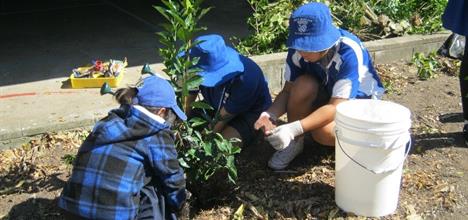Incursions - Live the learning at your school
Where we bring our teachers and resources to you!
Revegetation Program - Plant Out!

Year Level: P-12
Curriculum Focus: Sustainability, Citizenship, Action for the Environment
The Plantout program has been designed to assist schools implement outdoor learning spaces. JWEEC delivers this program in consultation with school staff. Examples include Native Gardens, Bushtucker Gardens, Butterfly Gardens, Sensory Gardens and Food Gardens. Students learn about what to plant, how to plant and then actively “plant out" a garden. JWEEC assists with sourcing plants and landscape materials and has developed a biodiversity trailer that is equipped with all the physical resources required for plantouts with groups.
Appropriate Plants for Schools
Time: 2-4 hours.
Maximum Number: 3 class groups (75 students) per day.
Compost Critters
Year Level: Pre-school - 6
A hands-on investigation on critters in the compost and why they are important. Working in pairs students will explore the living things found in the soil/compost and identify them using ID cards, a hand lens and micro-eye microscope. They will identify the external features of these organisms and make links to the environments where they are found. They will investigate where they live and what they eat (discover foods to put in compost).
Time: 45 min sessions
Maximum Number: 4 class groups (100 students) per day.
Reptiles
Year Level: Prep-6
A hands-on presentation at your school learning about the needs of three intriguing reptiles: turtle, blue tongue lizard and carpet python.
Time: 45 min sessions.
Maximum Number: 3 class groups (up to 80 students) per day.
*Please note numbers are limited due to animal ethics around reptile handling.
E.g.
Year Level: Prep
Curriculum Focus: Living things have basic needs including food and water.
Year Level: 1 - Scales & Tails
Curriculum Focus: Living things have a variety of external features and live in different places where their needs are met.
Year Level: 5
Curriculum Focus: Living things have structural features and a variety of adaptations that help them to survive in their environment. Students observe the external features and adaptations fo the reptiles and learn about how these help them to survive.
Freshwater Bugs
Year Level: P-6
A hands-on activity catching water bugs in a local creek. Alternatively, our teacher can bring a sample into the school. Students investigate life in freshwater with the use our 'Big Eye' microscope.
Time: 3 x 11/4 hour sessions at a local creek or 4 x 1 hour in class.
Maximum Number: 3-4 classes (75-100 students) per day.
E.g.
Year Level: 2
Curriculum Focus: Living things grow and change and have offspring similar to themselves.
Year Level: 3
Curriculum Focus: Living things can be grouped on the basis of observable features.
Year Level: 5
Curriculum Focus: Living things have structural features and a variety of adaptations that help them to survive in their environment.
Indigenous Perspectives
Year Level: P-6
Curriculum Focus: Various
JWEEC staff will create a learning experience at your school designed to engage with Aboriginal & Torres Strait Islander histories and cultures. Lessons will be tailored to meet the needs and requirements of the class and may include aspects of bush-tucker, fire-making, and Indigenous games.
Time: 3 x 1 hour sessions.
Maximum Number: 3 class groups (75-80 students) per day.
Well-Being: Mind-Body-Spirit
Year Level: P-6
Workshop to encourage students to connect with self and others, connect to nature and care for our planet. Activities are tailored to your students / group numbers and may include animal yoga, animal therapy, problem solving challenges, initiative games, grow green, nature journaling or mindfulness in nature.
Time: 30-45min workshops.
Maximum Number: 4 class groups (100 students) per day.
Energy - Power Up
Year Level: 6
Curriculum Focus: Electrical energy can be transferred and transformed in electrical circuits and can be generated from a range of sources.
Interactive demonstration of various energy generators including a steam engine and solar powered personal fans. Students use energy measurement devices (power mates) to determine energy use of various appliances and/or use a solar cooker to bake solar cookies.
Time: 3 x 1 hour lab workshops.
Maximum Number: 3 class groups (80 students) per day.